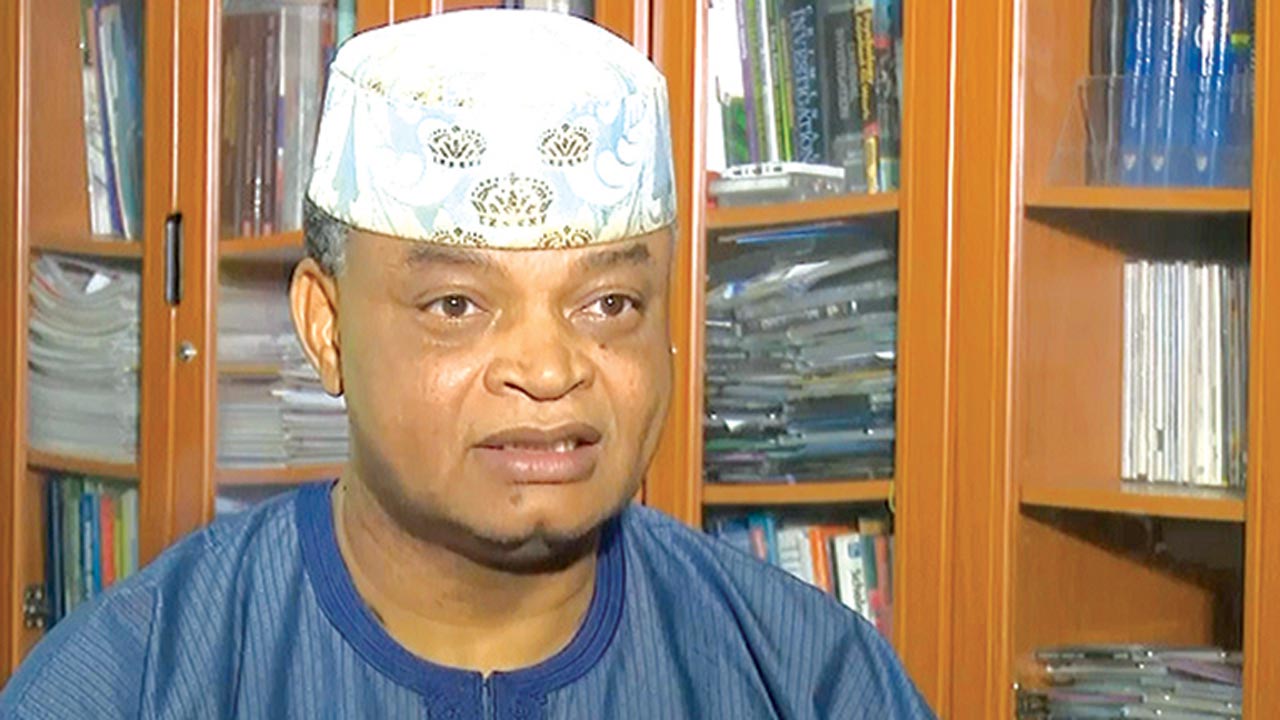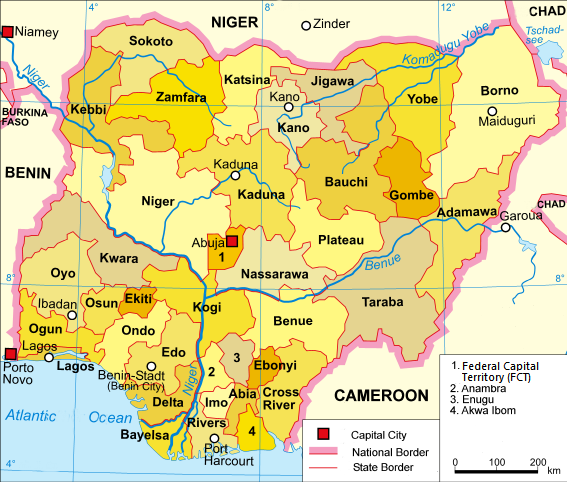Yesterday a posted an article entitled ‘Curbing the menace of ritual killings in the southwestern states‘. Appropriate as it was to draw the attention of our readers to this worrisome and frightening situation, it nevertheless seems useful to paint a more general picture of the security situation in Sub-Saharan Africa’s most populous country.
Everyday Nigerians are facing an extremely dangerous situation consisting of political and criminal violence, ritual murders (‘money-rituals’), abductions, kidnappings, ransom cases, by terrorists, bandits, political thugs, ritual killers, cultists, criminals, and traditional herdsmen. A personal experience in this respect may illustrate the foregoing.
A couple of years ago I visited Nigeria for professional reasons. My employer, the Ministry of Foreign Affairs of the Netherlands, had made the use of a special, armored car mandatory for government officials when traveling in Abuja or the rural areas. The only other countries with a similar precaution and obligation were Iraq and Afghanistan. No wonder, that last year the Global Terrorism Index (GTI) ranked Nigeria the third most dangerous county on earth, after Afghanistan and Iraq.
Therefore, I consider it useful to get to know the observations and warnings of Dr. Ona Ekhomu, a well-known Nigerian security expert, when reading about and analyzing ritual murders in the Nigeria. As repeatedly said before, Nigeria ranks number One with respect to ritual murders in Africa, but this should nevertheless be judged against the background of an alarming security situation in general (webmaster FVDK).
Insecurity: Government must keep its end in this social contract, says Security expert, Dr. Ona Ekhomu

Published: January 2, 2021
By: The Guardian News, Nigeria
I REALISTICALLY expect the security situation in Nigeria to worsen this year. Given that the national and sub-national governments have not taken the time to understand the scope of threat and risk spectrum, there is no serious effort to resolve the security conundrum.
The authorities have continued to rely on intuitive thinking in a situation that requires critical thinking and complex problem-structuring and problem-solving methodologies.
Therefore, the security situation will worsen because a wound that is not treated becomes an ulcer. In research design, we say that past is prologue to the future. So, what is the evidence of insecurity in Nigeria? Amnesty International recently published that in the first six months of last year, over 1,126 persons were killed mostly in the rural areas where “the authorities have left communities at the mercy of rampaging gunmen.”
According to Dataphyte Nigeria, over 70,000 Nigerians have been killed in the last nine years in acts of criminal violence. The Boko Haram/ISWAP insurgency has killed over 37,500 persons, displaced 2.5 million and created 244,000 refugees. In the first quarter of 2019, Nigeria recorded over 685 kidnap for ransom cases.
Clearly, this statistic will pale into insignificance when you consider 4th quarter of last year, where in one fell swoop, over 344 students were abducted in Kankara, Katsina State.
In December alone, about 26 travelers were seized by bandits along Benin-Auchi road and marched into the forest at Igieduma in Edo State. The Sultan of Sokoto, Alhaji Abubakar Sa’ad III, at the Nigerian Inter-Religious Council meeting in Abuja in November last year, warned that the security situation in northern Nigeria had gotten out of hand and bandits (terrorists) had overrun the region.
He said in some parts of the north, bandits walk around openly carrying AK47 rifles without being challenged by security agents. The Sultan revealed that 76 persons were killed in a Sokoto community, yet it went unreported. The frequency of kidnappings, killings, murders had become high that it was not news worthy anymore.
The Global Terrorism Index (GTI) for last year ranked Nigeria the third most terrorism impacted nation on earth. With this ranking, Nigeria is rubbing shoulders with Afghanistan and Iraq.
The security scorecard for Nigeria last year is very poor. Government performed below expectation in its most important duty of keeping citizens safe, as kidnappers, bandits, killer herdsmen, cultists, ritual killers and political thugs had a field day at the expense of citizens.
The Northwest terrorism (euphemistically referred to as banditry) intensified with several communities in Zamfara, Katsina, Niger, Kaduna and Sokoto states deserted due to incessant attacks and wanton killings and kidnappings by the aggressors. The so-called bandits have resorted to levying farmers millions of naira to harvest their farms. The situation in the Northwest is likely to trigger a food crisis in Nigeria this year.
In the Northeast region, Boko Haram/ISWAP insurgency continued to flourish, with terrorists attacking targets at will and shedding blood of innocent citizens without compunction.
The chief driver of insecurity in Nigeria is the incapacity of security agencies to prevent attacks against soft targets. The philosophy of the security agencies is to take casualties and then counter-attack.
The agencies are supposed to design an architecture that will prevent attacks in the first place. However, due to severe resource constraints and leadership factors, they adopt the counter-punch strategy. In other words, the authorities are adopting a law enforcement approach to a terrorist threat.
In dealing with terrorism, the best approach is prevention and disruption of plots. Any time a terrorist attack occurs, the effects are devastating. Every incident of terror (mass kidnap of travelers, mass abduction of school children, suicide bombing, roadside bombing, attack on traditional rulers on the highway, brutal rape of female travelers, killing of farmers in the bush, even cannibalism by killer herdsmen, etc.) is a statement of grave insecurity.
Many Nigerians avoid road travels because of fear of terrorist attacks along the Kaduna-Abuja highway, Lokoja-Okene highway or Benin-Auchi highway. These are killing fields where bandits emerge from the foliage and open fire on total strangers, not a targeted attack to rob them and then kidnap the survivors of the initial attack for ransom. Those unable to pay ransom are liable to be executed. In some instances, ransom is paid and the victim is killed.
The unfortunate trends in insecurity will continue and probably be exacerbated. What are the trends?
There would be an increase in highway kidnappings. It is a low risk and high yield venture that government does not seem willing to confront head on.
There would be an intensification of Northwest banditry, as the vast landscape is largely ungoverned. A situation where bandits could hide 344 students in Rugu Forest is unfortunate.
The Northeast insurgency is likely to intensify. The new leadership of ISWAP is quite bloodthirsty and would continue to tax communities and kill persons without justification.
Attacks on Army Supercamps by ISWAP will continue. Having succeeded in overrunning military bases and posts, the terrorists would take on the more hardened targets, like Supercamps.
Ansaru terrorist attacks would multiply and flourish in Kaduna and Kogi states. These terrorists are likely to infiltrate south into Edo and Delta states. Security planners in those South-South states are urged to be forward thinking.
The epidemic of terrorist violence would continue with piracy and illegal oil bunkering in the Niger Delta region. The IPOB agitators would continue to attack Police personnel and soft targets in the Southeast.
Cult violence would continue to claim lives in Edo, Delta, Rivers and Cross River states.
Ritual killings would continue to flourish in the Southwest states.
Source: Insecurity: Government must keep its end in this social contract, says Ekhomu

